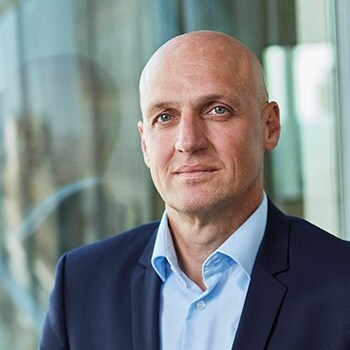News and Updates > Dr. Jan Kimpen, Senior Medical Advisor, answers key questions from patients
Dr. Jan Kimpen, Senior Medical Advisor, answers key questions from patients
February 16, 2023
As we continue to make progress on shipping replacement devices, we caught up with Dr. Jan Kimpen, Senior Medical Advisor, to explore some of the most common questions we’re hearing from patients, from device safety to the latest testing and research results. Dr. Kimpen is a physician and former Professor of Pediatrics who is passionate about patient safety and wellbeing.

Dr. Jan Kimpen
Senior Medical Advisor
I’m feeling unsure about using my replacement device. How do I know it is safe?
It’s natural to feel concerned and we understand that the recall may make you worry whether your replacement device is safe to use. Please know that we have taken many steps to ensure your safety. For example, while recalled devices contained a polyester-based polyurethane (PE-PUR) sound abatement foam component, the sound abatement foam in new and remediated devices is a silicone foam. The replacement silicone foam has met all applicable industry testing standards, including particulate and VOC emissions testing, and is authorized as part of our remediation.
Take a look at a short video on our website which shares more detail on our comprehensive testing and research for first-generation DreamStation devices*, including the differences between the foam used in affected vs. new or recertified devices, how we replace device parts and how we deal with any cosmetic blemishes.
I recently saw Philips Respironics announced testing and research results for first-generation DreamStation sleep therapy devices*. What do they mean for me as a patient?
Independent testing is a key part of ensuring that patients have confidence in our devices. As you may have read in our December press release, the latest results were encouraging because “they showed that exposure to particulate matter emissions from foam degradation was not likely to result in an appreciable harm to health. These results further indicate that the exposure to volatile organic compound emissions (VOCs) is not anticipated to result in long-term health consequences for patients.” Please note, however, that the FDA is still considering the data and analyses Philips Respironics has provided and may reach a different conclusion. Further, Philips Respironics’ guidance for healthcare providers and patients remains unchanged and continues to move forward with its recall remediation program.
We value the relationship between a doctor and patient, so it’s important to talk with your care team about whether you should continue using an affected device while you wait for a replacement. As a device manufacturer, we cannot directly advise a patient on their individual sleep therapy.
More details on the latest test results can be found on our website, and my advice is for each patient to talk to their doctor to understand what these results mean for your treatment. Additionally, it’s important that healthcare providers and patients use the complete testing update from our website (including information on the limitations of the testing) for any informed decision making and should not solely rely on this overview.
Testing is continuing for DreamStation Go and System One devices, and we will share an update as soon as we can.
Why has testing taken so long?
In June 2021, when the voluntary recall began, we had limited safety and risk data. Based on what we knew then, we began a comprehensive test and research program to help understand potential health risks. External validation and testing is a vital part of the remediation program - but takes time. The tests we have carried out are extremely thorough and require several months to complete. Some tests must be carried out in sequence, adding to the time required.
Your test and research mentioned 3rd party qualified experts. Why are these experts needed?
Patient trust and confidence are vital as we move forward. Independent, third-party experts - meaning people and groups outside of Philips - are an important part of reassuring patients and rebuilding trust. We’ve been working with five of the largest independent certified laboratories in the world, as well as third party experts and physicians to carry out thorough testing and research. You can read more about these testing results, or watch a short video on our website.
Why do I need a prescription for my device?
When your doctor prescribes CPAP therapy, the prescription includes information that is specific to your situation. We need patients to share their prescription to ensure that the device works according to individual needs.
If you have specific questions that aren’t covered here or on the website, please contact us.
*First generation DreamStation devices include DreamStation CPAP/Auto CPAP/BiPAP, DreamStation BiPAP ASV, DreamStation BiPAP AVAPS/ST, E30 Ventilator
